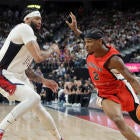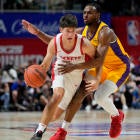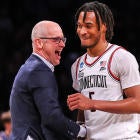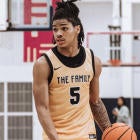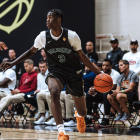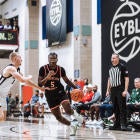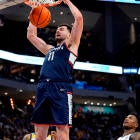Scene: Alamodome in San Antonio, Texas. It’s a Monday evening in 1998. (If you can believe it, we’re almost 20 years removed.) The top-seeded, acclaimed Kentucky Wildcats are going for their second men’s basketball title in three seasons. Utah, seeded third, is trying to pull an outrageous upset. The overachieving Utes, coached by a brilliant basketball tactician, the late Rick Majerus, are led most notably by future NBA starting point guard Andre Miller, who’s a junior. Michael Doleac, a cedar of a center and consummate college performer, is a vital senior.
Then there’s this tweener forward with the blond hair, No. 13. A sophomore starter, his name is Hanno Möttölä. Utah loses, but Möttölä plays solidly (15 points, eight boards). His uniform says Utah but he plays on behalf of an entire country. Finland’s population at the time is approximately 5.2 million, and Möttölä is the first player from there to ever start in a Final Four. There hasn’t been one since.
Under Majerus, Möttölä turns into a really good four-year college player, averaging better than 16 points between his junior and senior seasons in Salt Lake City. In 2000, the implausible happens: He is drafted by the Atlanta Hawks. He only sticks two years in the league, but for a Finnish player, it’s a legendary basketball journey. He’s the first Finland native to play in the NBA. There hasn’t been one since.
Möttölä goes on to play another 11 years in Europe. In retirement, he settles in Helsinki and becomes a club coach.
Ice hockey is the most popular sport in Finland and there is no close second. Beyond the gap, soccer, volleyball and Pesäpallo, a bat-and-ball cousin to baseball -- and the official national sport of the country -- come next. Way down on the list is basketball, though it is growing. It’s grown in good part over the past 15 years because of Möttölä, and it will change forever because of his protégé.
Out in the American Southwest, there’s a pasty, 7-foot, muscle-bound, 19-year-old blond-haired revelation named Lauri. He’s probably got a basketball in his hands right now. The dry, roasting, clay-orange desert that surrounds Tucson, Arizona, is the climatic opposite from frosty Finland. That dichotomy serves as backdrop to one of the best stories in college basketball this season.
Arizona is 25-3, ranked No. 4 and in the midst of one of the most surprising seasons in college hoops. Yes, the Wildcats are a modern-day power, but this team lost five-star player Terrance Ferguson to ineligibility in the fall. Then former five-star recruit Ray Smith gave up basketball for good after another devastating injury. Projected Pac-12 First-Teamer Allonzo Trier waited in limbo for more than three months after failing a PED test. What was supposed to be unfeasible has instead transformed the Wildcats into a national title contender.
Lauri Markkanen is why.
The Finnish phenom is, potentially, an all-timer. A towering sharpshooter, Markkanen comes from a basketball family, bolstered in promise by Möttölä’s tutoring. Markkanen could be the puzzle-solver. He could be the guy to lift Arizona coach Sean Miller to the first Final Four of his career, and he could be the next European-born NBA superstar. But beyond that, most importantly, he could change basketball’s popularity in his home country forever. Because truly great hardwood players don’t come from the Nordic. Not until now.
Maybe 100 miles over the Atlantic Ocean, the plane suffers engine failure.
It’s September of 2015, Sean Miller’s recruiting calendar is fastidiously planned out down to the hour, and now the flight can’t continue on. Miller’s on a Finland-bound trip with his Arizona assistant, Joe Pasternack, who tipped his boss off to this lanky Finnish kid, a tantalizing player possible of changing the future of Arizona basketball. Markkanen’s talent is so tempting, Miller decides it’s worth it to travel more than 11,000 miles round-trip to try and land a recruiting longshot amid a very busy and critical recruiting cycle.
And now the plane is turning back around to JFK. The flight gets canceled. Planes to Finland out of New York City aren’t populating the daily schedule, so Miller and Pasternack scramble for more than six hours trying to get on a bird to put them in Helsinki as soon as possible. There’s merely three days worth of travel allotted for the only in-home visit they’ll get with the future NBA big who owns the steadfast stroke of a veteran shooting guard.
“Sometimes it’s lost that when you recruit [internationally], there’s only so many times you can go over there,” Miller said. “You can’t go in June because of NCAA rules. In July, the only way you can watch is if they are in an official tournament. There aren’t as many chances as people think, but if you wanted to recruit in person you had to go in September and October.”
After an arduous waiting game, a flight option surfaces -- but with only one seat available. Of course. So the head coach has to go, meaning Pasternack is forced to fly home in the opposite direction. Miller’s rerouted, with layovers, and is on the ground in Finland for all of maybe 12 hours. Lauri’s father, Pekka, who played at Kansas and spent 15 years as a pro in Europe, doesn’t even meet Miller on the visit. Möttölä is there though, and they dine with Lauri on reindeer and bear, trying some of the best of Finnish foodie culture. Ironically, it’s the first time Markkanen tries some of the food as well. Miller’s never experienced anything like this. Finland is impressive and clean. So is its basketball prodigy, the quiet kid with the killer stroke, the guy who will eventually save Arizona’s 2016-17 season.
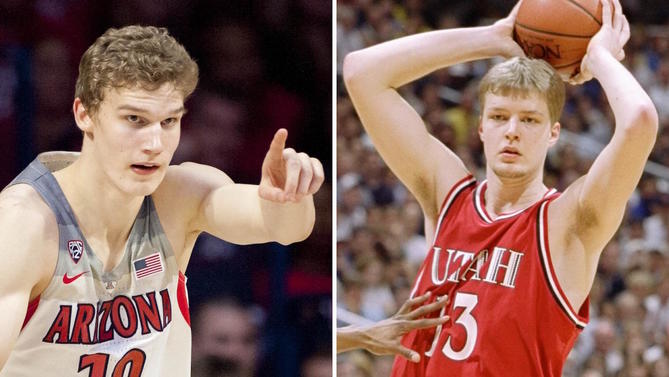
“If I didn’t get there, I don’t know if we would‘ve had a real chance to get Lauri,” Miller said. “After the trip, I wasn’t foolish enough to think it was over.”
Markkanen was most seriously being recruited by North Carolina coach Roy Williams -- who was at Kansas when Pekka Markkanen played there -- and Utah, which had the Möttölä connection and the climate most similar to Finland. Arizona was a firm third at the start of the process.
But Miller was boosted by his involvement with USA Basketball, as he coached the U-19 team that year in the world championships. That roster included current college hoops stars Josh Jackson, Jalen Brunson, Caleb Swanigan, Jayson Tatum and Harry Giles. Allonzo Trier, now a sophomore at Arizona and also Markkanen’s roommate, was also on that team. In coaching against FIBA-level competition from around the world, Miller earned an instinct for international talent; he knew more of what to look for and which guys would have true potential at a high-major American university.
The 48-year-old Miller is considered in the industry on the very short list of the best college coaches. But he’s not yet made a Final Four, a line item that now feels mandatory in stories such as this one. In recent years, Miller expanded his recruiting philosophy. He looked around the American recruiting landscape and determined that skilled big guys weren’t abundant. Sometimes the West Coast talent pool dries up, so how do you adjust? The program needed to look overseas, be it in Australia, Europe, anywhere in the world.
Who knew Finland would provide one of the biggest opportunities of Miller’s career?
Sisu.
That’s the word you won’t find on draft scouting reports, but it’s what best describes Markkanen. It’s Finnish, and it means hardy, persistent, having indomitable willpower, stubborn bravery.
“It’s our national identity,” Riikka, Lauri’s mother, said.
Markkanen grew up the youngest of three sons to Pekka and Riikka, both athletes, both of whom played basketball. The family home was a mile from downtown Jyväskylä, which is the seventh-largest city in Finland. Markkanen walked to school.
It is a clean place, an organized place, an efficient city of not even 150,000 people. Lauri got great at basketball by playing endless hours in the backyard under summertime light. Because it is so far north, Jyväskylä experiences extreme days in the summer and is overrun by nightfall in the winter. The city, pinned narrow by three substantial, scenic lakes, is sheened by the post-midnight gloaming in its darkest moments between May and August. Winter months are afforded four precious hours of sunlight.
Markkanen was born in Vantaa, Finland, a municipality just touching the outer edges of greater Helsinki. From the ages of 1-3, the family lived in France. Pekka, now 49, played there in addition to Finland, Spain, Hungary and Germany. France was the last stop. Because of the language exposure, Markkanen didn’t speak Finnish fluently until he was 5 years old. By the time the family settled in Jyväskylä, Pekka had a court and hoop set up in the backyard. Even as a small child, Markkanen was prone to sports, almost all of them. He loved skiing -- every discipline. Slalom, cross-country, even practicing ski jumping in the family’s backyard.
“His first touch for basketball was when he was five, and that was his first hobby,” Riikka said. “He used almost all his free time just playing basketball. And once I remember him playing with his grandad when he was about 10 years old. [They played] for one hour and a half, and grandad was already finishing. Lauri said, ‘No, come back, we still have to do our stretching!”
Markkanen spent thousands of hours playing, many of them alone. His oldest brother, Eero, did not like basketball. But older brother Miikka and dad did. Mom was a very good player, too. But Lauri loved it more. He had to love it more.
“Lauri has always had a passion for this,” Pekka said. “Miikka played, and that was helping set an example, but all in all, Lauri hates that basektball comes from family or his mom and dad. He doesn’t want to be the next in line.”
Everything comes from his own fire within. This is his doing. It is not a bequeathal from father to son. And everything was always a competition.
“When he played basketball, it was often outside and alone, but there is competition with older brothers, even playing street hockey and ice hockey, European football, all of it is competition,” Pekka said. “It was tough for Lauri because he was so much younger. He lost a lot. He wanted to be like his older brothers, and that’s why he continued practicing and practicing and practicing. And he was thinking, ‘I will kick your ass when I get older.’”
Said Markkanen: “People are competitive back home, and our family was especially. It just, I think it came from I wanted to win, so I wanted to work even harder every time. It was an obsession, like, ‘I don’t want to leave the gym.’”
Markkanen is serious but also social. He is not a loner, but his innate shyness is produced by Finnish culture. The Finnish don’t talk if they don’t have to something to say. It is their ethos.
“How can I describe ... it’s very difficult to say,” Pekka said with a pause, unintentionally explaining it all.
One reason Markkanen is so good is because he sincerely listens.
“He is more ‘observer,’” Riikka said.
Basketball has been his learning sponge for years, something he dedicated himself to full-time when he gave up organized soccer after seven years. Pekka didn’t like that; he’d done that very thing when he was a teenager, and hoped his youngest wouldn’t do the same. But because soccer practices interfered with basketball workouts, Markkanen made his choice. His former coaches tried for two years to lure him back to the pitch.
Markkanen instead could be found in the gym.
After playing his freshman year at the local high school, Markkanen’s game and reputation had grown to the point where he was recruited to play for Helsinki Academy, 3 hours and 15 minutes south by car from Jyväskylä. His parents divorced in Lauri’s early teen years, and Riikka moved with Lauri to Helsinki, where he went to high school at Mäkelänrinne.
Markkanen got better by playing against men on club teams, most of them with three American players (the most allowed). The game schedule wasn’t rigorous, and it enabled Markkanen to play, listen, learn -- then practice relentlessly still.
“I think it was good for me because we were able to concentrate on practicing every day,” Markkanen said. “Every player was on the junior national team as well. We had a talented team and it was a good experience to play against older guys too.”
Markkanen wasn’t all basketball all the time, though. He had many friends and made time for social events. He watched “The Big Bang Theory” and “The Simpsons.” And then there’s disc golf. The family loves it. It’s big-time competition, a tradition among the Markkanens. Eero is the best, but Lauri refuses to tell me that. (Pekka tells me later.) After the season, no matter what happens with the NBA, they will all get together and fling the frisbees.
“That’s the big thing with me and my family, we compete a lot back home,” Markkanen said.
Speaking to him by phone, I ask him what Helsinki was like, what he misses about Finland.
“One thing I like to do, but I haven’t had a chance, is I like playing hockey with my friends,” he said. “I like to watch it, too. It’s been a long time.”
A few seconds go by.
“I wish I had a chance to do that again. It’s been three or four years.”
Now imagine the 7-footer on skates. And dominating.
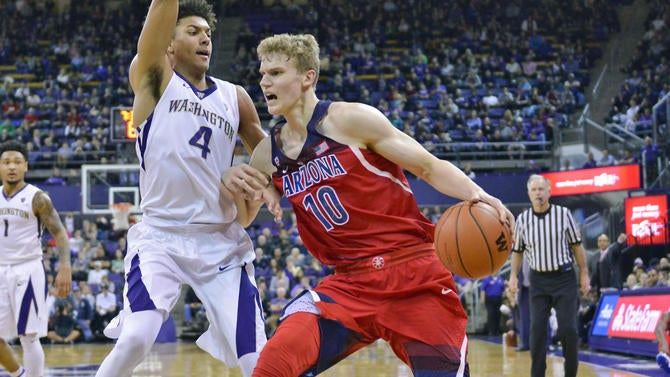
Because his father played at Kansas and because Möttölä experienced four years at Utah, by the time Markkanen was 16 it was basically decided that he’d be leaving Finland for the States. Not “maybe go to college or maybe try to be a pro in Europe.” No, this was a developmental decision to get the best training and attend a major university, to keep learning, to keep listening. Basketball is a niche sport in Finland; a semi-professional league is the highest level of play there.
There was only one instance in which Markkanen opened the door to a different avenue. He was invited to Valencia, Spain, essentially an agents-and-team recruiting summit just for him. He and the family took meetings, and a contract offer was put before him. The money wasn’t great, the years were worse. Valencia’s franchise wanted Markkanen’s rights for seven years, and his financial ceiling was a fraction of what it stood to be if he succeeded in Division I while setting himself up for the NBA. Coincidentally enough at the time, Kristaps Porzingis was dominating in Liga ACB, the league Markkanen was being courted to.
In the coming years, those two might wind up as the best international players in the NBA.
“He was uncomfortable being a pro so young,” Pekka said. “He wanted to keep up with his studies. I think that affected his mind a little bit. It was a crazy offer, not a big amount of money. Of course we were pleased he did not sign.”
European basketball, to Lauri, was not going to give him enough all-around skill development. The NBA had become a logical dream, and he wasn’t about to give up his youth in Finland to sit on the bench and deal with the politics of maybe-yes maybe-no with an NBA team trying to land his rights down the road.
“That’s one reason I wanted to play for my country,” Markkanen said. “The best part of it is, everyone works together. It’s really fun to represent my country because, like I said, I don’t know how to explain that, but everyone works together. There’s no individuals. Team success is better than individual success, that’s the mindset.”
The Finnish ideal.
Markkanen got better in Finland and starred in back-to-back summers in FIBA play, turning into one of the best young rebounders in all of Europe. His deep-shooting ability went from rumor to widespread fact.
“Sometimes when you’re really tall and shoot the ball as well as he does -- you’re not from the US -- you get that stereotypical knock that ‘he’s soft,’” Miller said. “Lauri is the furthest thing from soft. It kind of makes you want to fly over there and see what else is there.”
And for a five-star talent, he’s got no ego, Miller said.
“In today’s climate in college basketball that is not often the case,” he said. “They come with their subset of expectations, problems and maintenance. There are not maintenance issues with Lauri, and that’s part of why we’ve had so much success with him.”
Markkanen was initially struck by Utah, but after going on an official visit to Arizona with his parents, experiencing the crowd environment in the program’s famous preseason intra-squad game and seeing what Miller had achieved in getting so many players to the NBA, the decision came quickly.
“I think it was the trust and the fit in what they were looking for,” Miller said. “Pekka really understands the game of basketball.”
Arizona also had a big need for a big man. Markkanen knew he’d play immediately, and Pekka admits that played a huge part as well. Utah’s facilities and landscape, plus Larry Krystkowiak’s coaching prowess, all of those factors made it such a close call.
“I also think Lauri didn’t really believe (in) his chances in North Carolina,” Pekka said. “It might be too big a level to get enough playing time, maybe that’s true, but of course right now everything looks different.”
Said mom: “After he decided to choose going to USA of course as a mom I was a little bit fearful, but at the same time very proud. Because his passion for basketball and getting better is so big.”
We’ve never seen any freshmen -- ever -- in college hoops quite this tall be quite this good as a 3-point shooter. Markkanen’s made 59 of his 129 treys this season (46 percent) and his offensive rating (points per 100 possessions) is a superb 131.2 at KenPom.com. He’s not just a 3-point threat, though. Markkanen (who still doesn’t have a driver’s license) will probably flirt with top-five draft status this spring because he’s strong, a consistent rebounder and a smart spacial player.
It’s hard to pass on a muscular player with reputable work ethic who can shoot from 23 feet and isn’t afraid to bruise in the paint at both ends. Markkanen is markedly singular at the college level and could be special in the NBA.
“Everyone thinks I’m a spot-up shooter, but I can do a lot of things with my height,” he said. “Back at home I was used to rebounding the ball and pushing it by myself and being an all-around player. I can still do a lot of things.”
Miller has expanded Markkanen’s game in the past two months. He’s now a better back-line defender, and he’s more aware of how to guard the low post against players who know how to work that area. It is rare to get a coach to be this effusive about a player so early into his college career.
“He has an inner toughness to him,” Miller said. “He is incredibly driven. He knows why he’s here. He wants to be an NBA player. He puts the work in every day. Loves the game. You don’t have to force him to do anything. He’s as consistent a practice player or a worker as we’ve ever had. I don’t mean by the good-player standard — I mean by anybody. He’s got a will to be great. He’s serious but not in a negative way. When it’s practice, when it’s film, he asks questions, is where he’s supposed to be, does what he’s supposed to do. It’s a fun campus, but he’s not that type of guy. He keeps things simple. He’s a guy you don’t get often as a coach because of how talented he is, but the incredible, incredible kid that he is.”
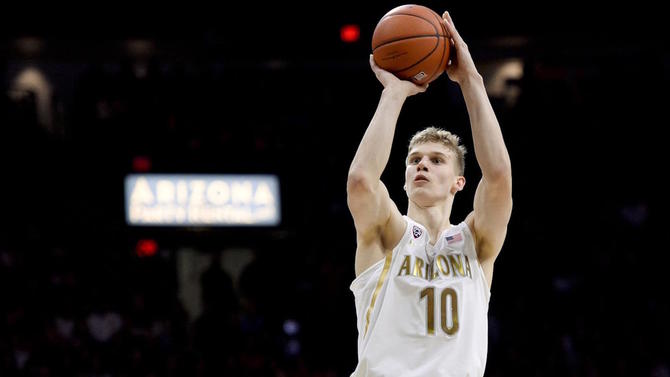
It’s a fun sight: This devastating 7-foot new-age basketball weapon, a Finnish import thriving in the heat of the desert.
“It’s nice to be in a warm place after spending 19 years in the cold,” Markkanen said.
He’s been hot since he took his first shot in Tucson. Reliability has been the reason Arizona’s made a charge to the top five of the polls and might still even snag a No. 1 seed. Markkanen has not missed one practice, not one workout, not one game. He’s played through sickness, he’s played through slumps. Now averaging 15.7 points and 7.9 rebounds, he’s one of the best first-year college players in the deepest class of freshmen in a decade. In most years, he’d be a top-three freshman in basketball. Now he’s probably one of 10 who will go in the top 15 of the 2017 draft.
But the college season is far from done, and Markkanen’s moment could be coming. He could turn into a national name in March if the Wildcats can reach the Final Four. It would make for a great story locally, nationally and internationally because this year’s bracket wraps up just up the road from Tucson. The Final Four will be in Phoenix for the first time.
“I’m going game by game, but of course I’m excited about March Madness,” Markkanen said earlier this week. “That was the one (American) sporting event I was able to watch in Finland.”
Technology and streaming devices allowed Markkanen watch the tournament. Soon he’ll be a part of it, like Möttölä was every year at Utah.
“That was 17 years ago now,” Pekka said. “It’s time to get a new chapter for the NBA. I don’t know if it happens now or a year later, but hopefully it’s Lauri. And there are more coming.”
Great basketball players do not come from Finland. They’re not supposed to, anyway. It’s Croatia, France and Australia. Serbia, Spain and Argentina. Now that can change. Now we see someone so clearly gifted and innately assertive. There once was only Hanno Möttölä, but now there is Lauri Markkanen. Basketball is global, meaning basketball can be Nordic. It can be Finnish. College basketball’s international evolution has arrived. And there are more coming.









